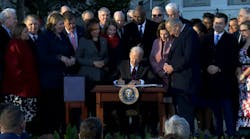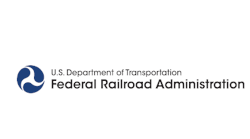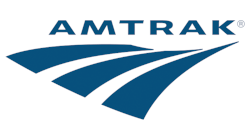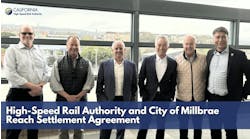New FRA program to facilitate development of intercity passenger rail corridors
The Federal Railroad Administration (FRA) established the Corridor Identification and Development (ID) Program that will establish a pipeline of intercity passenger rail projects and guide where investments and technical assistance are applied. FRA says this pipeline will allow for these projects “to be implemented faster and with greater coordination than ever before.”
The Bipartisan Infrastructure Law passed in November 2021 directed the Corridor ID Program be established within 180 days of the law’s enactment. FRA explains the program gives public entities a formal mechanism to partner with FRA to develop proposals that will expand, enhance or restore passenger rail service in their communities. FRA is required to submit a project pipeline report to Congress within a year of the program being established, which will be updated by Feb. 1 in the subsequent years.
"Americans deserve what people in many other countries currently benefit from: a world-class rail system that allows you to get where you need to go quickly and affordably, while reducing traffic and pollution on our roads," said U.S. Transportation Secretary Pete Buttigieg. "In launching the Corridor Identification and Development Program, which was made possible thanks to President Biden’s Bipartisan Infrastructure Law, we are taking a major step to transform America's passenger rail network and connect our smallest towns and our biggest cities with great train service."
FRA can authorize up to five percent of the available funding for the Federal-State Partnership for Intercity Passenger Rail grants program for the Corridor ID Program. FRA has made $1.8 billion available.
Projects will be selected using 14 criteria including if a route was identified as part of a regional or interregional planning study; travel times and how competitive those are to other transport modes; estimated ridership, revenues and costs; the economic and environmental impact and if the project serves rural or underserved communities, among other criteria.
“The Corridor ID Program will help expand intercity passenger rail service beyond the Northeast Corridor,” FRA Administrator Amit Bose said. “The Bipartisan Infrastructure Law is an opportunity to build a better America and the Corridor ID Program will strengthen the partnerships and project pipeline necessary to reshape America’s passenger rail network for generations to come.”
FRA says it will begin soliciting formal proposals for the program within 2022. Once selections have been made, FRA will work with the entity that submitted the proposal, the relevant states and Amtrak, if appropriate, to prepare or update a service development plan.
Amtrak called the establishment of the Corridor ID Program “an important next step” in the U.S. expansion of passenger rail.
“We are excited for state transportation departments and other parties to notify the FRA that they are interested in proposed new routes and expanded service to be considered by the FRA as part of this federal program. This is an easy, effective and no-cost way for states and local groups to take the first step and bring more trains to more people in their home states and across America. We look forward to seeing which states and other parties submit Expressions of Interest to the FRA, and to working with all stakeholders to advance more trains to more people across America,” Amtrak said.

Mischa Wanek-Libman | Group Editorial Director
Mischa Wanek-Libman is director of communications with Transdev North America. She has more than 20 years of experience working in the transportation industry covering construction projects, engineering challenges, transit and rail operations and best practices.
Wanek-Libman has held top editorial positions at freight rail and public transportation business-to-business publications including as editor-in-chief and editorial director of Mass Transit from 2018-2024. She has been recognized for editorial excellence through her individual work, as well as for collaborative content.
She is an active member of the American Public Transportation Association's Marketing and Communications Committee and served 14 years as a Board Observer on the National Railroad Construction and Maintenance Association (NRC) Board of Directors.
She is a graduate of Drake University in Des Moines, Iowa, where she earned a Bachelor of Arts degree in Journalism and Mass Communication.





